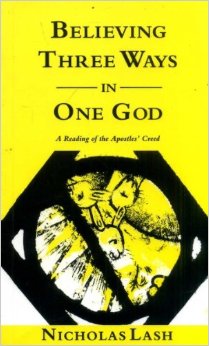 Nicholas Lash, in his 1993 book Believing Three Ways in One God: A Reading of the Apostles’ Creed, eases into some doctrinal reflections on “the question of revelation” with these remarks:
Nicholas Lash, in his 1993 book Believing Three Ways in One God: A Reading of the Apostles’ Creed, eases into some doctrinal reflections on “the question of revelation” with these remarks:
The legacy of the Enlightenment left us with what we might call a crisis of docility. Unless we have the courage to work things out for ourselves, to take as true only that which we have personally ascertained, or, perhaps, invented, then meanings and values, descriptions and instructions, imposed by other people, feeding other people’s power, will inhibit and enslave us, bind us into fables and falsehoods from the past.
Even God’s truth, perhaps especially God’s truth, is no exception to this rule. Only slaves and children should be teachable, or docile.
The Enlightenment, in other words, tended to treat teaching and discovery as antithetical activities. Teaching is what we take from other people and is, therefore, at best unreliable and, at worst, degrading; truth is what we find for ourselves.
Lash notes immediately, “but this antithesis is most unreal.”
By naming the Enlightenment (or its legacy) as his foil, Lash suggests that he might be gearing up for a scuffle over epistemology proper. Instead, what he offers in place of the antithesis, teaching versus discovery, is a gesture toward the attitudes, affective dispositions, and intellectual postures necessary for knowledge for learning and teaching to occur.
Admittedly, we only know as true what we have ascertained, established, worked out to be so. But that is how we learn –‘doctor’ and ‘disciple’ do, after all, have a common root. Good teachers understand this: they know that truth imposed, and not elicited, is most ill-learned. Good teaching is respectful of those taught.
These remarks seem to be about the pedagogical culture of a learning community. So having addressed the teachers, he turns to the requirements for the students:
Good learning calls, no less than teaching does, for courtesy, respect, a kind of reverence: for facts and people, evidence and argument, for climates of speech and patterns of behaviour different from our own. Watchfulness is, indeed, in order, but endless suspicion and mistrust are not. There are affinities between the courtesy, the delicacy of attentiveness, required for friendship; the single-minded passionate disinterestedness without which no good scholarly or scientific work is done; and the contemplativity which strains, without credulity, to listen for the voice of God –who does not shout.